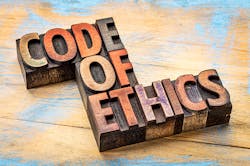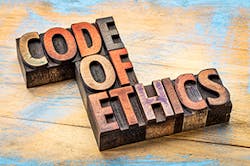I called a plumbing service company recently to investigate a leak in our shower above the kitchen. They quoted me $195.00 for the work. Two hours later I had five holes in my kitchen ceiling, a messy bathroom, and no conclusive source of the leak. A few days later I received an invoice for $641.00. This event left me feeling the need to take a look at HVAC industry ethics and how to avoid leaving our customers feeling like I did.
Ethics are defined as a set of moral principles; a bundle of values we use to determine what’s right and wrong.Just as you acknowledge the laws of physics when you design, install, and service HVAC systems, there are laws of ethics that impose predictable forces on your life and business. The better you understand these laws, the more successful you’ll become.
This article is focused on how ethical behavior avoids offending your customers. It steers clear of social issues dealing with workplace offenses, discrimination, and other legal issues.
How you apply ethical principles can make or break your relationships with customers. The cost of unethical behavior is the loss of future business, usually because you offend a customer. A wise business owner can justify the cost of strengthening company ethics based on real financial benefits and relationships producing future opportunity.
Typical HVAC Industry Offenses
Over the past few weeks I inquired about ethical issues currently plaguing our profession. It appears some hot topics include product and service pricing, diagnostic errors, and employee compensation.
Timely Disclosure of a Price Change -- When you quote an initial price to a customer, good ethics require you to tell the customer before additional costs are incurred. In the case of my leaky shower, the plumber gave me no notice of additional charges to his quote. I had no idea what the charges were for.
I understand there are legitimate new charges. In the HVAC business, such charges can come from events like:
- Finding a fried circuit board
- Discovering electrical system defects that weren’t apparent during the quote process
- Exposing system deficiencies in normally inaccessible areas.
When new opportunities to improve the system performance are discovered during the course of a job, there is an ethical obligation to disclose the findings, price the repairs, and allow the customer to consider the need for the additional cost.
Construction projects use a change order to identify, document, and approve the scope and cost of changes that arise during a project that weren’t included in the original contract. A similar procedure should be used on a residential service project after the cost of an initially quoted repair when additional repairs are identified.
Misdiagnosis or Non-diagnosis -- The HVAC profession is highly technical and few of your customers have the knowledge to evaluate your service or replacement recommendations. That’s why most customers rely on the trust they hold for you and your company.
Good diagnostics should be accompanied by a description of the problem expressed in terms and examples easily understood by your customer. Effective professionals have the empathy and communication skills necessary to discuss the results of the diagnostics with customers and address their concerns until they are confident enough to make a decision.
If the system is older, you have a responsibility to share the risk that other system components may also perform poorly and are at risk of future failure. This can be a touchy discussion to engage in. If you overemphasize this point, your customer may feel threatened, thinking they are being oversold. By not discussing what the risks are of not replacing system components and you’ll lay the groundwork for a disappointed and angry customer when the system does eventually fail.
If you read my articles, you are aware of the difference in equipment rated efficiency and the actual efficiency of the system once it is installed. The average installed system performs less than 60% of the equipment efficiency rating. The liability of decreased system efficiency caused by poor installation practices is increasing at an alarming rate.
A Change in Product Specifications -- If you need to change the product specifications, you should get agreement from the customer in advance. The day a project is completed is no time for your customer to discover you couldn’t or didn’t provide the quality or efficiency specified in the contract.
I referred an HVAC service company to a friend of mine last summer with complete confidence. A month later, I received a phone call from the customer that the contractor sold them a 20-SEER system, but only installed one rated for 17 SEER.
The error was an oversite due to the manufacturer’s marketing materials representing the maximum efficiency of the series of equipment. But the customer was rightfully concerned with the appearance of a bait-and-switch tactic.
Excessive Profit Sharing -- Today many companies are using aggressive pricing that can be five or six times market rates. The excess profit squeezed from the unwary customer is then shared with the salesperson or technician. This unethical pricing strategy is not only unfair to the customer, but also damages the good name of our industry.
If employee compensation is only tied to the profit earned on each job, might the company owners be sending a signal to employees that the way customers are treated may not be as important as represented in your code of ethics?
We just reviewed a few examples of ethical violations found in our profession. Are there more? Sure. The purpose of this article is to provide time for you to consider your actions and personally make a commitment to strengthen your ethical stance. Like most changes needed in our industry, change is made one person at a time.
Rob “Doc” Falke serves the industry as president of National Comfort Institute an HVAC-based training company and membership organization. If you're an HVAC contractor or technician interested in a free Code of Ethics outline, contact Doc at [email protected] or call him at 800-633-7058. Go to NCI’s website at nationalcomfortinstitute.com for free information, articles, and downloads.
About the Author
Rob 'Doc' Falke
President
Rob “Doc” Falke serves the industry as president of National Comfort Institute an HVAC-based training company and membership organization. If you're an HVAC contractor or technician interested in a building pressure measurement procedure, contact Doc at [email protected] or call him at 800-633-7058. Go to NCI’s website at NationalComfortInstitute.com for free information, articles and downloads.


